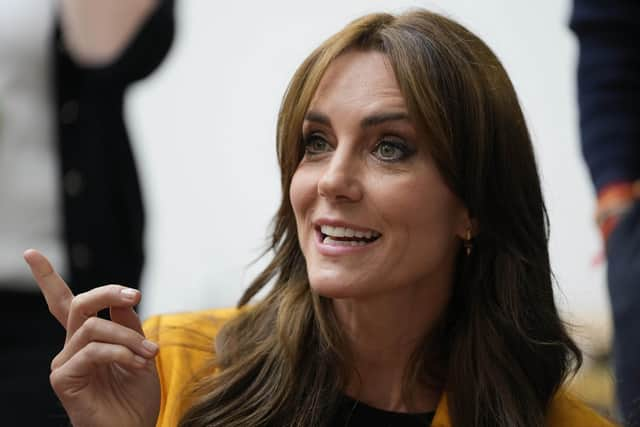Cancer Research UK provide advice how to talk to your child about cancer after Princess Catherine's diagnosis
and live on Freeview channel 276
With the news that Princess Catherine is now dealing with cancer, the delicate topic of how she might approach breaking the news to George, Charlotte and Louis has now been brought up. Given their respective ages, would trying to explain the diagnosis to the young royals be an issue and how did the Prince and Princess of Wales break the news to their children?
"William and I have been doing everything we can to process and manage this privately for the sake of our young family,” the Princess of Wales said in her video message discussing her diagnosis on Friday afternoon. “As you can imagine, this has taken time. It has taken me time to recover from major surgery in order to start my treatment. But, most importantly, it has taken us time to explain everything to George, Charlotte and Louis in a way that is appropriate for them, and to reassure them that I am going to be ok.
Advertisement
Hide AdAdvertisement
Hide AdBut what approach did Princess Catherine take with the three young royals, and what advice could be given to other parents who have to break the delicate news of their cancer diagnosis to their children and younger family members?
Cancer Research UK believe that being as prepared and as patient as possible with family members is one of the most important ways to inform younger people about a cancer diagnosis. “Talk to your doctor, nurse or counsellor before you speak to your children - they can help you prepare what to say and how to answer any questions your child might have to
rehearse what you are going to say or write it down. Say the words ‘I have cancer’ aloud to yourself so it is less of a shock when you say it to your children, and have some resources or props with you - they may help you talk, or may simply make the first conversations less intense.”
“You don’t have to tell them everything. Give them small pieces of news, gradually building up a picture of your illness. You can find out what they know or ask them what they want to know. Try and explain any misunderstandings and ask them if they have any questions - don’t assume that they have the same concerns as you. Try and answer these but you can be honest and tell them you don’t know some answers.”


Advertisement
Hide AdAdvertisement
Hide Ad“Try and keep the conversation about what is currently happening. You don’t have to predict the future or what might happen. You can explain to your children how this might affect their daily life and routines. For example, if you are in hospital, who will take them to school or be there when they come home.”
Involving children in family decisions and maintaining open communication can help them cope with changes, such as a family member's illness. Establishing a routine with a visible calendar, incorporating fun activities, and using tools like a worry box encourage expression and understanding, while the charity also says it's beneficial to listen to their play to gauge their feelings and to introduce comfort objects for separation anxiety.
“It doesn’t matter if you cry or show them you are upset. It can help them to see that it's normal to cry and be honest about feelings. Show your children that you love them by telling them and hugging them and reminding them that they will always be looked after.”
Comment Guidelines
National World encourages reader discussion on our stories. User feedback, insights and back-and-forth exchanges add a rich layer of context to reporting. Please review our Community Guidelines before commenting.
